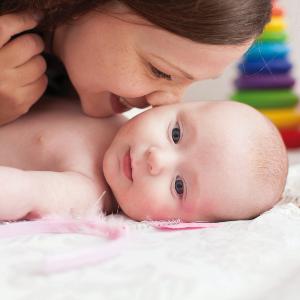COMPARE Study
A study funded by the Federal Ministry of Education and Research on the prevention of transgenerational transmission of mental disorders

A study funded by the Federal Ministry of Education and Research on the prevention of transgenerational transmission of mental disorders

At the Munich site, the study is being led by Prof. Dr. Corinna Reck, Lea Kaubisch, and Anamaria Semm (formerly: Dr. Christian Woll, Dr. Verena Labonte, Dr. Sophia Wriedt).
The COMPARE study (Children of Mentally Ill Parents at Risk Evaluation) has the following objectives:
The study is divided into several subprojects, which are being carried out at various universities in Germany. We are cooperating with:
Phillips University of Marburg
University of Heidelberg
Justus Liebig University Giessen
Ruhr University Bochum
Dortmund University of Technology
At LMU in Munich, we are conducting the subproject "Interaction and Development."
The study is aimed at families with newborns whose mothers experience psychological stress during pregnancy or around the time of birth, but also at mothers who feel healthy and experience little psychological stress.
You are welcome to contact us even before the birth of your child. If you are interested in participating in the study, please contact:
Information on the study being conducted at the Heidelberg site can be found on the Heidelberg University project homepage.
The planned study focuses on the intergenerational transmission pathways of maternal psychopathology and examines families during the first two years of the child's life in which the mothers suffered from depression and/or anxiety disorders during the peripartum period.
Maternal depression and anxiety disorders during the perinatal period pose a risk to child development. Comorbid disorders can be seen as a sign of greater severity, and it stands to reason that comorbid disorders increase the risk of internalizing disorders in offspring. However, to date, there are no studies that compare families in which mothers suffer from depression alone or from comorbid depression and anxiety disorders with a healthy control group. The planned study aims to close this research gap.
The study focuses on the effects of maternal psychopathology during the peripartum period on child development, taking into account the role of the father and parental couple interaction. Parent-child interaction, couple interaction between parents, and child stress reactivity are analyzed as possible intergenerational transmission pathways between maternal psychopathology (pure depression, comorbid depression and anxiety disorder, healthy control group) and child development.
The planned study aims to generate new insights into the specific effects of maternal psychopathology on various aspects of children's social and cognitive development and, in addition, to shed light on the underlying mediating effects in transmission, so that promising prevention and intervention approaches can be developed in the future. The following correlations will be examined:
This is a controlled longitudinal study without randomization. Randomization is not possible because the study has a quasi-experimental design: mothers are assigned to the appropriate group based on their perinatal mental illness.
The planned study will examine women with peripartum depression with and without comorbid anxiety disorders according to DSM-5 (Falkai & Wittchen, 2015) over a period of 24 months, as well as the fathers, children, and a healthy control group. The study will be conducted simultaneously at LMU Munich and Heidelberg University Hospital. It is scheduled to begin at the same time. The duration for both locations is 48 months. A total sample size of N=174 is targeted across both study locations. For the two clinical groups (purely depressive, comorbid anxiety disorder), a group size of n=29 subjects per location is to be achieved, as is the case for the healthy control group. The entire survey will take place at four measurement points.
If you are interested in participating in the study for the sub-project ‘Interaction and Development,’ please contact:
LMU München
Department Psychology
Psychotherapeutic university outpatient clinic for children, adolescents and parents with mental health issues
Leopoldstr. 44
80802 Munich
Underground lines: U3 or U6, Giselastraße stop (Martiusstraße exit)
Bus connections: 54, 58, 68, 154